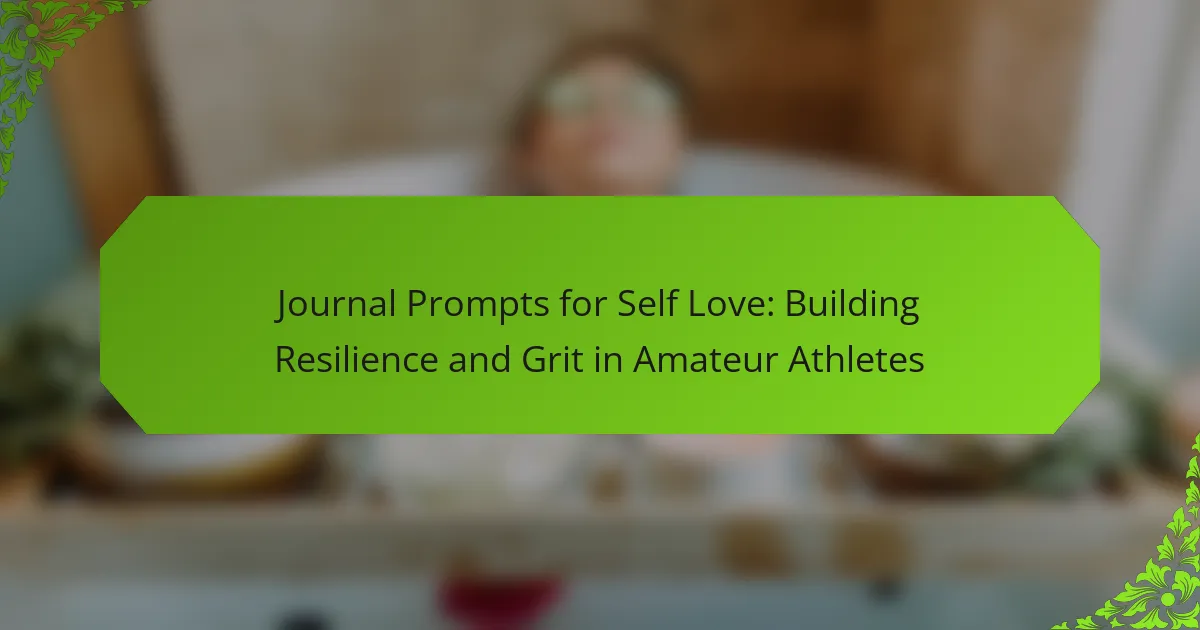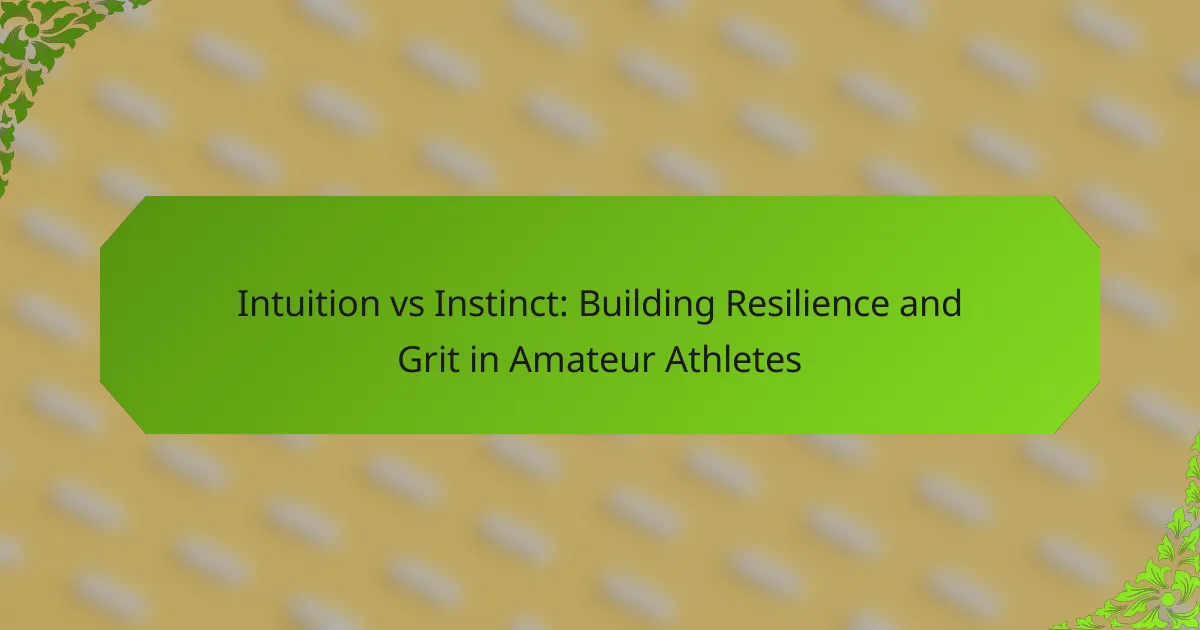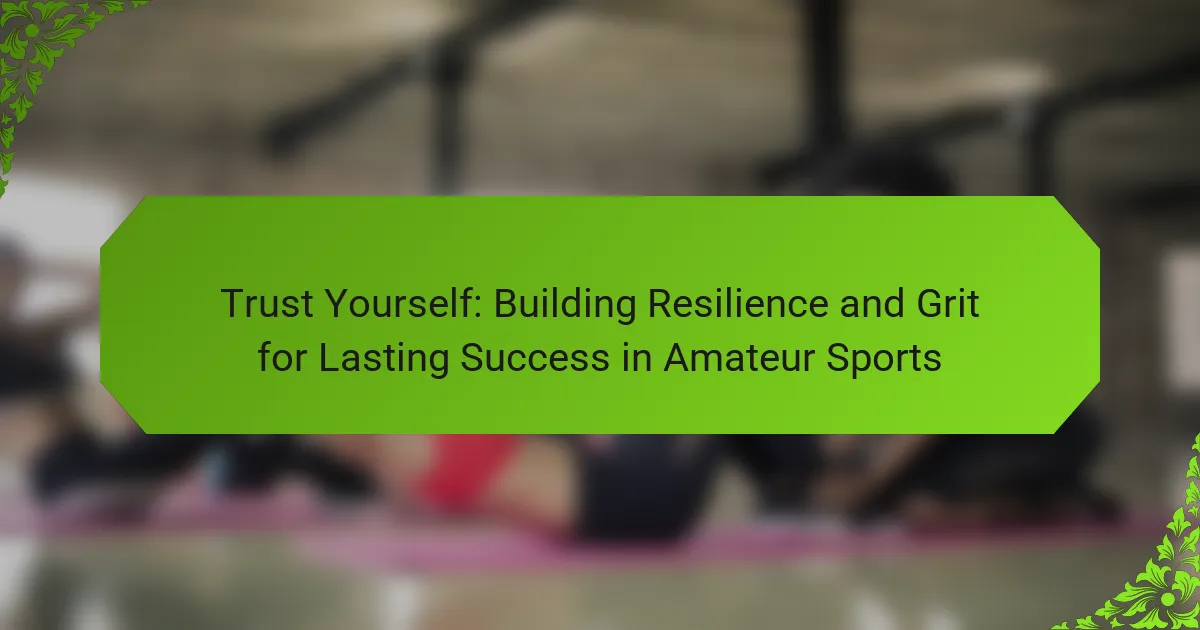Resilience is essential for amateur athletes to overcome setbacks and maintain motivation. This article explores the importance of mental toughness, goal setting, and social support in building resilience. It also highlights the role of adaptability and emotional intelligence in fostering grit. Finally, it addresses common mistakes that hinder resilience and offers strategies for improvement.
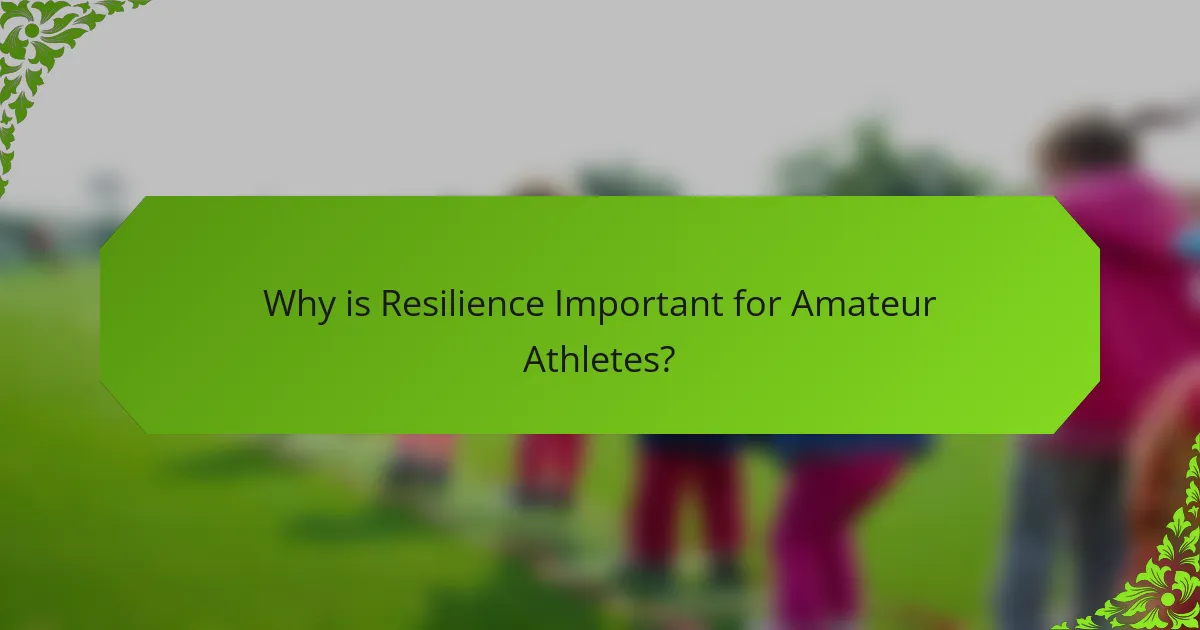
Why is Resilience Important for Amateur Athletes?
Resilience is crucial for amateur athletes as it enhances their ability to overcome setbacks and maintain motivation. This mental toughness allows athletes to push through challenges and improve performance. Studies show that resilient athletes are more likely to achieve their goals and experience greater satisfaction in their sports. Developing resilience fosters grit, which is essential for long-term success in athletics.
What are the key components of resilience?
Resilience consists of adaptability, mental toughness, emotional regulation, and social support. These components help amateur athletes overcome challenges and maintain focus on their goals. Adaptability allows individuals to adjust strategies in response to setbacks. Mental toughness fosters perseverance through adversity. Emotional regulation aids in managing stress and maintaining composure. Social support provides encouragement and resources, enhancing overall resilience.
How does resilience impact performance in sports?
Resilience significantly enhances performance in sports by fostering mental toughness and adaptability. Athletes with high resilience can better manage stress, recover from setbacks, and maintain focus during competition. This ability directly correlates with improved outcomes, as resilient athletes often display greater grit and determination. Research shows that resilience training can lead to a 20% increase in performance metrics among amateur athletes.
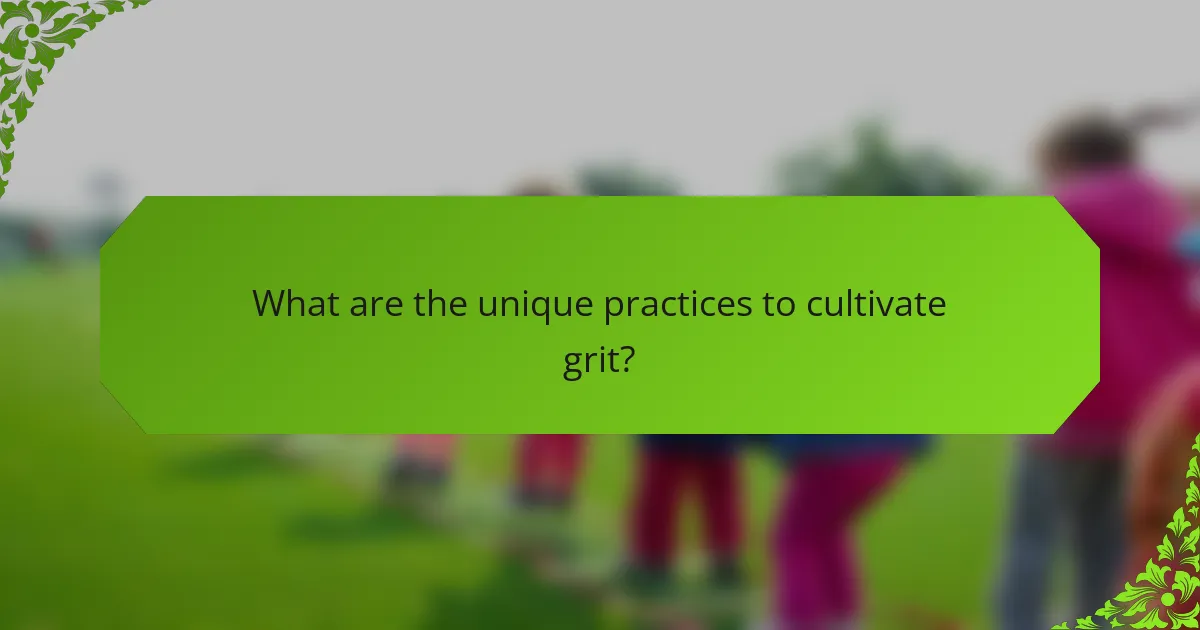
What are the unique practices to cultivate grit?
To cultivate grit, amateur athletes should adopt unique practices such as setting specific goals, embracing challenges, and maintaining a growth mindset. These practices enhance resilience and foster long-term commitment. Regular self-reflection can help identify areas for improvement, while seeking mentorship provides guidance and support. Engaging in consistent training routines builds discipline, and celebrating small victories reinforces motivation.
How can goal-setting enhance grit in amateur athletes?
Goal-setting enhances grit in amateur athletes by providing clear objectives and a sense of direction. This structured approach fosters resilience, encouraging athletes to push through challenges. Research indicates that athletes with specific, measurable goals exhibit higher levels of perseverance. Additionally, setting incremental targets can build confidence, reinforcing a growth mindset. As a result, athletes are more likely to remain committed and focused on long-term success.
What are the steps to effective goal-setting?
Effective goal-setting involves defining clear objectives, breaking them into manageable steps, tracking progress, and adjusting as needed. Begin by identifying specific, measurable, achievable, relevant, and time-bound (SMART) goals. Next, outline actionable steps to reach these goals, ensuring they are realistic and aligned with your overall vision. Regularly monitor your progress to stay motivated and make necessary adjustments to your approach, fostering resilience and grit throughout the process.
What role does consistency play in developing grit?
Consistency is crucial in developing grit as it fosters discipline and resilience in amateur athletes. Regular practice and adherence to routines strengthen mental fortitude, enabling athletes to overcome challenges. This persistent effort leads to gradual improvement and a deeper commitment to their goals. As a result, athletes build a strong foundation for resilience, which is essential for long-term success in sports.
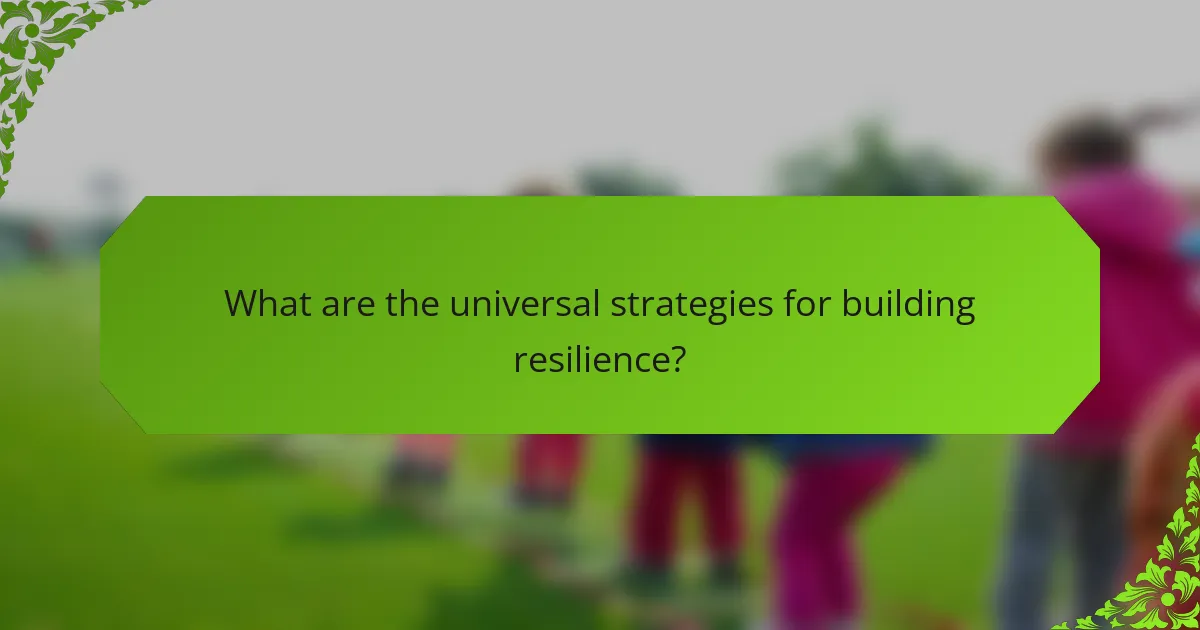
What are the universal strategies for building resilience?
To build resilience, amateur athletes can focus on mental toughness, goal setting, social support, and adaptability. These strategies foster grit and enhance performance without reliance on organized religion.
Mental toughness involves developing a strong mindset to overcome challenges. Goal setting provides clear objectives, motivating athletes to push through adversity. Social support from coaches and teammates creates a network that encourages persistence. Adaptability allows athletes to adjust their strategies in response to changing circumstances, enhancing their resilience.
How can visualization techniques improve mental toughness?
Visualization techniques enhance mental toughness by enabling athletes to mentally rehearse success and overcome challenges. They foster resilience by creating a clear mental image of goals, which boosts confidence and focus. Research indicates that visualizing positive outcomes can lead to improved performance and grit, essential traits for amateur athletes. These techniques help in managing stress and anxiety, allowing athletes to maintain composure under pressure. By regularly practicing visualization, athletes cultivate a robust mental framework that supports their overall resilience and grit.
What are the benefits of positive self-talk for athletes?
Positive self-talk enhances athletes’ performance by boosting confidence, reducing anxiety, and improving focus. It cultivates mental resilience, allowing athletes to overcome challenges effectively. Research indicates that athletes who engage in positive self-talk experience increased motivation and better stress management, leading to enhanced overall performance. This psychological strategy is crucial for developing grit, a unique attribute essential for amateur athletes striving for success.
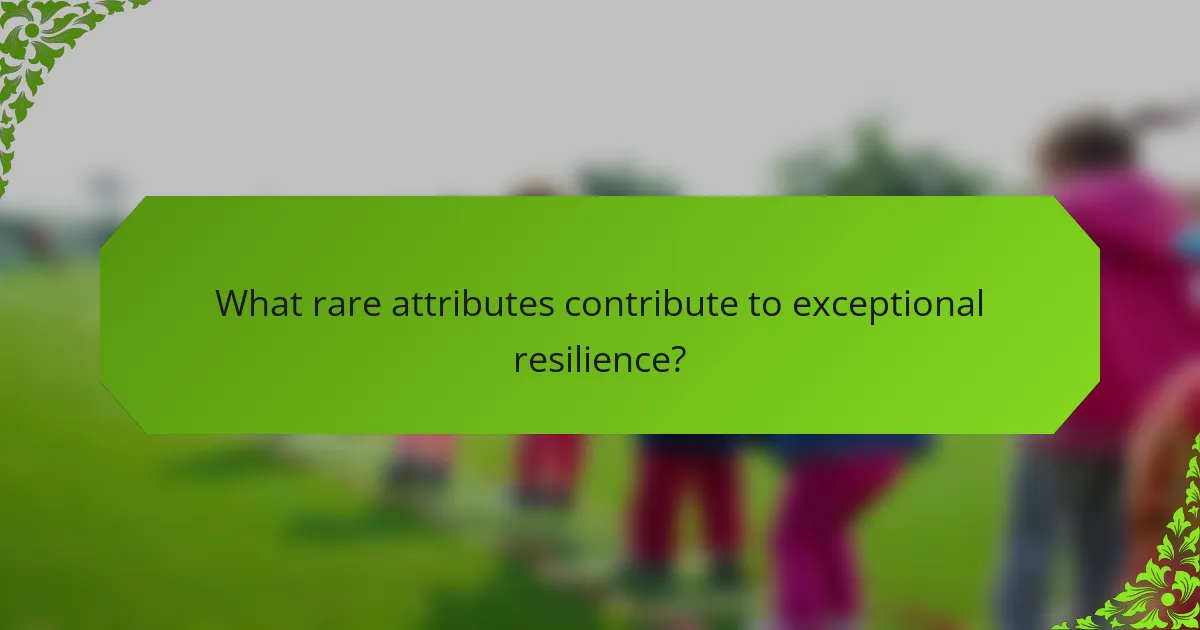
What rare attributes contribute to exceptional resilience?
Exceptional resilience in amateur athletes stems from rare attributes such as adaptability, emotional intelligence, and intrinsic motivation. Adaptability allows athletes to adjust strategies and mindsets in response to challenges. Emotional intelligence fosters self-awareness and empathy, enhancing team dynamics. Intrinsic motivation drives athletes to pursue goals for personal satisfaction rather than external rewards. These attributes cultivate a robust mental framework, essential for enduring setbacks and maintaining focus on long-term objectives.
How can adaptability enhance an athlete’s grit?
Adaptability enhances an athlete’s grit by fostering resilience in challenging situations. When athletes face adversity, their ability to adjust strategies and mindsets is crucial. This flexibility allows them to persist through setbacks, ultimately strengthening their mental toughness. Research indicates that adaptable athletes often demonstrate higher levels of perseverance and performance under pressure. Cultivating this adaptability not only improves their competitive edge but also builds long-term resilience, essential for sustained success in sports.
What is the significance of emotional intelligence in sports?
Emotional intelligence significantly enhances performance and teamwork in sports. It fosters resilience and grit, essential for amateur athletes facing challenges. High emotional intelligence allows athletes to manage stress, communicate effectively, and maintain motivation. Research indicates that teams with emotionally intelligent players demonstrate better cohesion and improved outcomes. Thus, cultivating emotional intelligence is crucial for developing mental toughness and achieving success in sports.
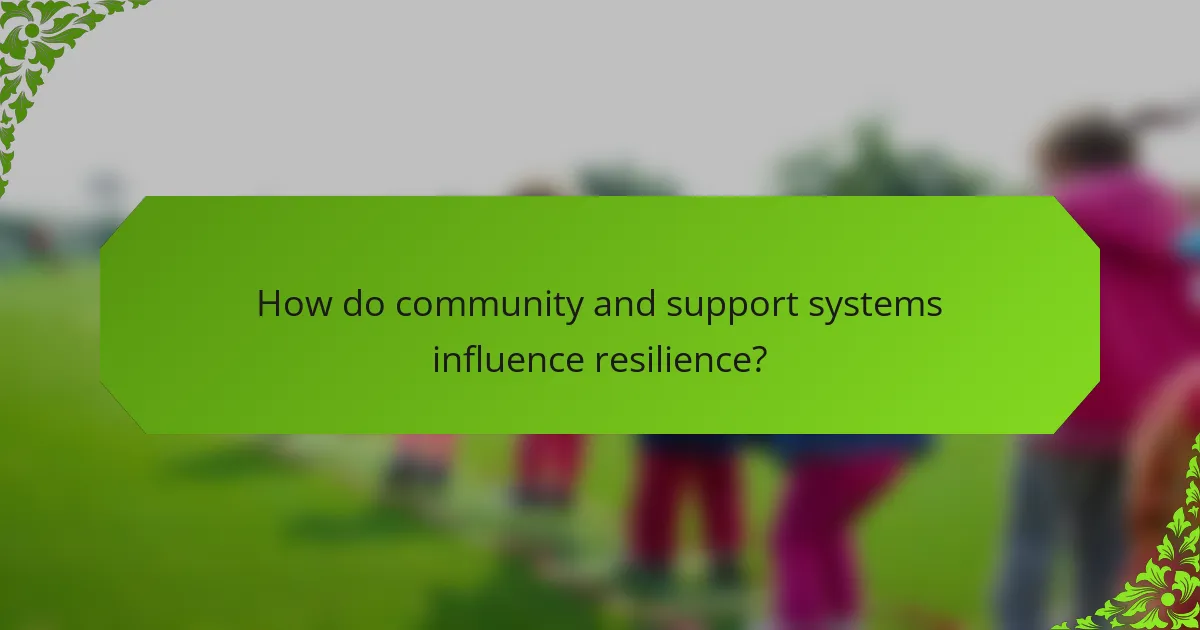
How do community and support systems influence resilience?
Community and support systems significantly enhance resilience by providing emotional backing and practical resources. Amateur athletes benefit from social networks that foster motivation and accountability. These systems create a sense of belonging, which is crucial for mental fortitude. Engaging with supportive peers can lead to improved performance and grit, as shared experiences bolster confidence and determination.
What role do coaches play in fostering resilience?
Coaches play a vital role in fostering resilience among amateur athletes by providing support and guidance. They help athletes develop mental toughness through structured training and positive reinforcement. Coaches teach coping strategies for setbacks, enabling athletes to learn from failures. This process cultivates grit, a unique attribute that enhances performance and perseverance in sports. By creating a nurturing environment, coaches empower athletes to face challenges confidently, ultimately leading to personal growth and improved athletic performance.
How can peer support enhance grit among athletes?
Peer support enhances grit among athletes by fostering a sense of community and accountability. This social connection encourages individuals to persevere through challenges. Research shows that athletes with strong peer support networks exhibit higher resilience levels, enabling them to cope better with setbacks. Additionally, sharing experiences among peers can cultivate motivation, reinforcing the belief in one’s abilities. This collaborative environment ultimately strengthens the mental toughness essential for athletic success.
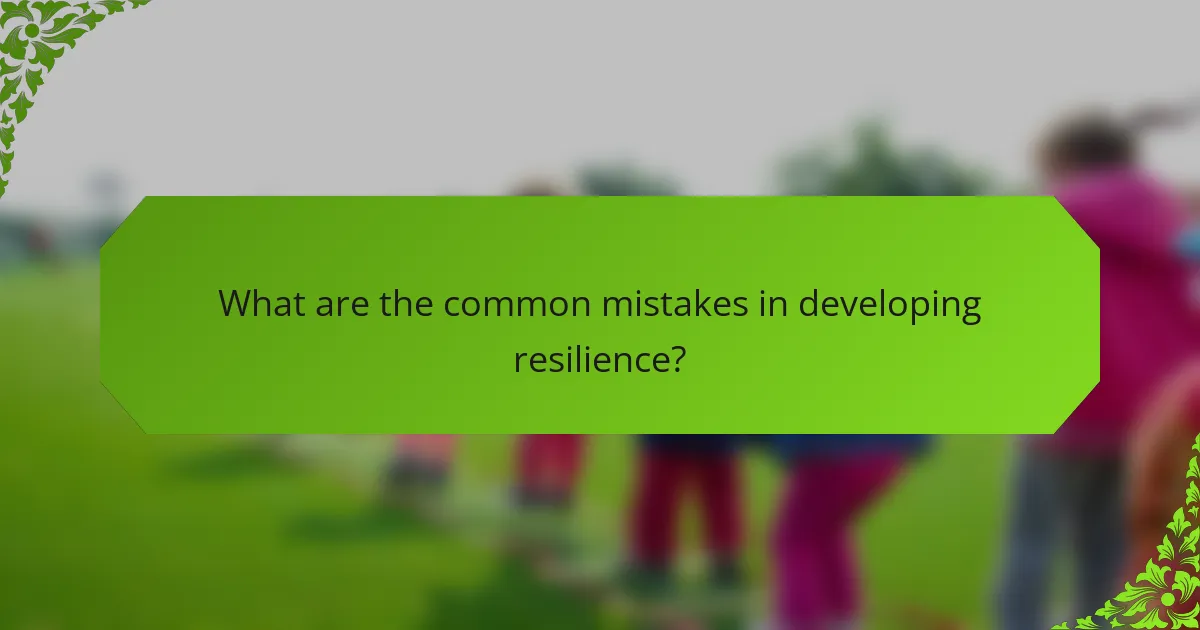
What are the common mistakes in developing resilience?
Common mistakes in developing resilience include a lack of self-awareness, unrealistic expectations, and neglecting emotional health. Amateur athletes often overlook their mental state, which is crucial for resilience. They may also focus solely on physical training, ignoring the importance of mental strategies. Additionally, comparing themselves to others can lead to discouragement, undermining their grit. Emphasizing personal growth over competition fosters a healthier mindset.
How can athletes avoid burnout while building grit?
Athletes can avoid burnout and build grit by prioritizing self-care, setting realistic goals, and fostering a supportive environment. Regular breaks and varied training routines enhance resilience. Mindfulness practices, such as meditation, reduce stress and improve focus, contributing to long-term success. Emphasizing intrinsic motivation strengthens commitment and perseverance.
What should athletes do when facing setbacks?
Athletes should embrace setbacks as opportunities for growth and learning. Developing resilience involves maintaining a positive mindset, setting realistic goals, and seeking support from coaches and peers. Practicing self-reflection helps athletes understand their challenges and adjust their strategies accordingly. Engaging in mental conditioning techniques, such as visualization and mindfulness, can also enhance grit and perseverance during tough times.
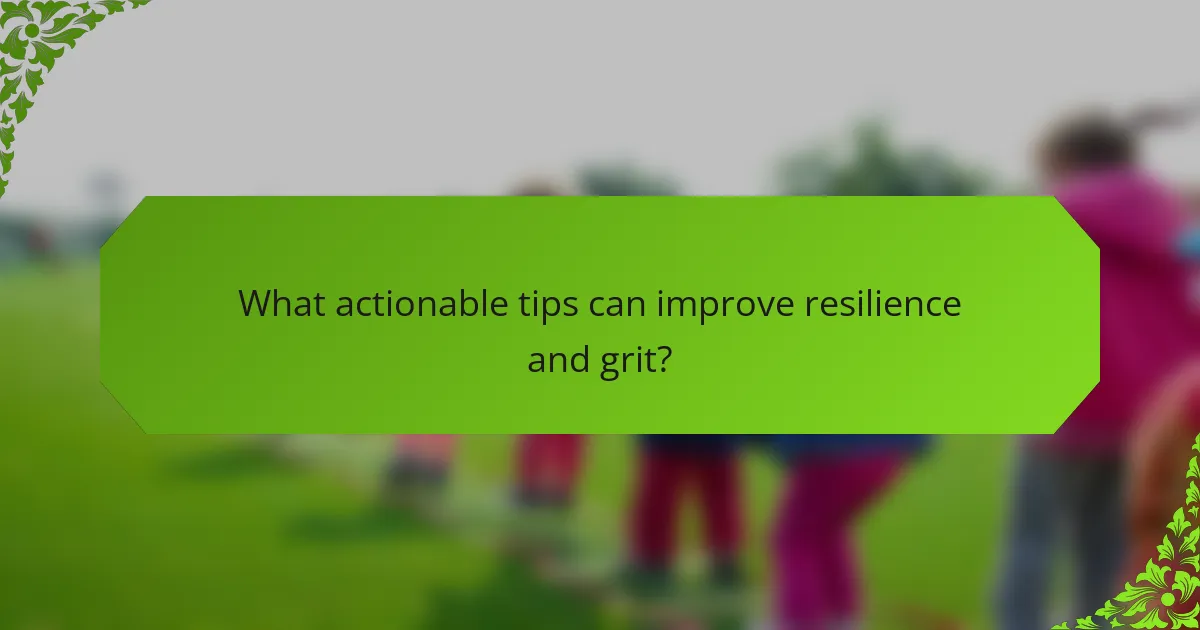
What actionable tips can improve resilience and grit?
To improve resilience and grit, amateur athletes should focus on setting clear goals, embracing challenges, and maintaining a positive mindset. Developing a routine that includes regular practice and reflection enhances perseverance. Additionally, seeking support from mentors and peers fosters a strong sense of community, which can bolster motivation. Prioritizing mental health through mindfulness and stress management techniques further strengthens resilience.
How can daily routines support resilience-building?
Daily routines can significantly enhance resilience-building by providing structure and stability. Consistent practices, such as regular training sessions and goal-setting, help amateur athletes develop grit. These routines foster discipline, enabling athletes to face challenges with confidence. Additionally, incorporating mindfulness or reflection into daily habits can improve mental fortitude, allowing athletes to manage stress effectively.
What are the best practices for maintaining motivation?
To maintain motivation, amateur athletes should focus on setting clear goals, developing a routine, and fostering a supportive environment. Establishing specific, measurable objectives helps track progress and maintain focus. Consistent training schedules create discipline, while surrounding oneself with encouraging peers enhances resilience. Celebrating small victories can also reinforce motivation.
